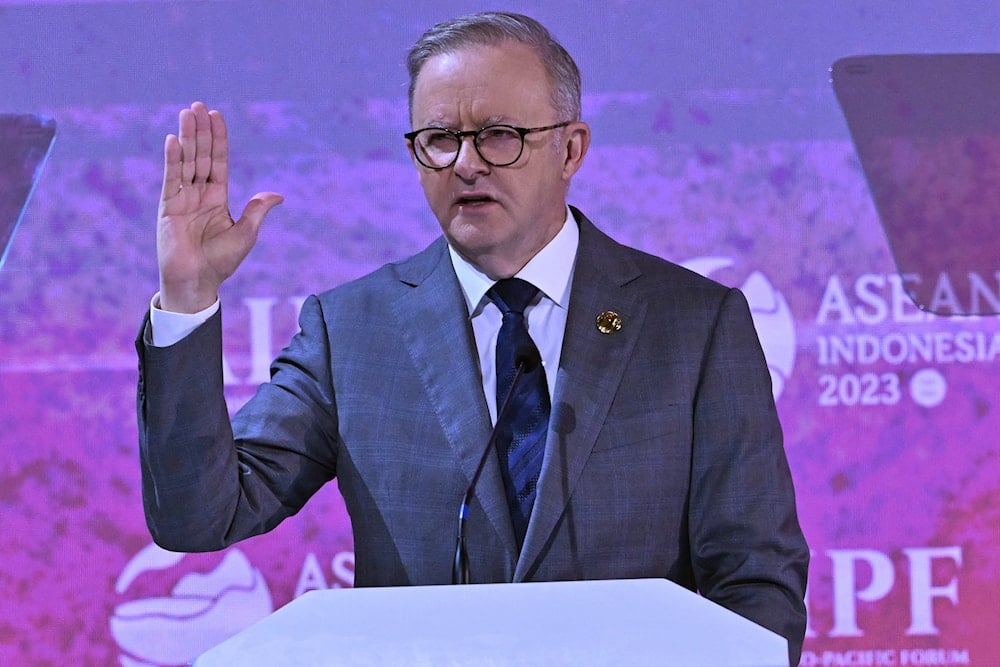Albanese defends $400m Nauru deportation deal amid criticism
Australian PM Albanese insists there’s "nothing secret" about Australia’s $400m Nauru deportation deal as critics raise human rights and transparency concerns.
-

Australia's Prime Minister Anthony Albanese speaks during the leaders' talk of the ASEAN-Indo Pacific Forum (AIPF) in Jakarta, Indonesia, on September 6, 2023. (Adek Berry/Pool Photo via AP)
Australian Prime Minister Anthony Albanese has defended a $400m Nauru deportation deal, insisting there is "nothing secret" about the arrangement amid growing questions over its cost, transparency, and human rights implications.
The agreement, quietly announced by the government on Friday without a dollar figure attached, will see about 280 members of the NZYQ cohort, non-citizens in Australia whose visas were cancelled on character grounds, deported to the Pacific island.
On Monday, Albanese said the policy was "hardly secret," though he refused to answer questions on the length of the agreement, or how and when the payments would be made to Nauru. "These are people who do not have a legitimate reason to stay in Australia," he told ABC’s Afternoon Briefing.
The NZYQ cohort deportation stems from a 2023 High Court ruling in favor of "NZYQ," a stateless Rohingya man convicted of child rape in Australia, who could not be indefinitely detained. The decision led to the release of dozens of non-citizens into the community.
The Assistant Immigration Minister, Matt Thistlethwaite, said it would be up to Nauru whether the deportees could live freely or face restrictions. "The funding that we’re providing is to help them settle people over there," he told Sky News.
Funding details and sovereign wealth fund
Under the agreement, Nauru will place the $400 million Nauru funding into its sovereign wealth vehicle, the Nauru Intergenerational Trust Fund, which had already surpassed $420 million before the deal’s announcement.
Nauru’s President David Adeang said the fund would support the nation’s "long-term economic resilience" and the operational rollout of the agreement. Australian ministers indicated that deportations would take place gradually to allow Nauru to prepare adequate systems.
The deal has sparked sharp criticism from human rights lawyers, refugee advocates, and the Greens, who labeled it "discriminatory, disgraceful, and dangerous." They questioned whether assurances had been made about the safety and treatment of deportees in Nauru.
Labor MPs have also expressed unease privately, with one telling The Guardian Australia: "I feel a little uncomfortable with it, but I guess the government is really trying to take the politics away and get rid of a problem that’s been there for a long time."
Neo-Nazis, politicians take part in Australia anti-immigration protest
On Sunday, thousands of people took part in March for Australia rallies across the country, with large crowds gathering in Melbourne, Sydney, Brisbane, Canberra, Adelaide, and Townsville. The demonstrations, branded as an anti-immigration protest, were condemned by government officials as divisive and racist.
In Melbourne, about 5,000 people gathered outside Flinders Street station carrying flags and placards with anti-immigration slogans. Police estimated similar turnouts across other major cities, with South Australia police putting the Adelaide rally’s attendance at around 15,000.
The protests drew a controversial mix of groups, including neo-Nazi figures, anti-lockdown activists, and far-right fringe movements. In Melbourne, Thomas Sewell, a known neo-Nazi, told the crowd: “If we do not stop immigration, then our death is certain.”
Prominent politicians also joined the rallies. One Nation leader Pauline Hanson, Senator Malcolm Roberts, and federal MP Bob Katter attended events in Canberra and Townsville. Their presence sparked criticism, with Victorian Premier Jacinta Allan saying those who “walk with Nazis” were undermining multiculturalism.

 4 Min Read
4 Min Read








